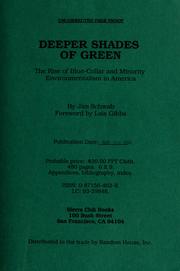Check nearby libraries
Buy this book

Deeper Shades of Green documents the convergence of two great American movements - conservation and the struggle for social justice. Environmentalists, once faulted for ignoring minorities and the poor, are recognizing the need to find common ground. Poor communities of all colors, the worst targets of pollution and waste-dumping, are perceiving that environmental ills are part of their larger fight.
Spurred to action out of concern for their families' health and safety, they are bringing new energy and focus to mainstream conservation.
As a blue-collar college student, author Jim Schwab worked summers in a Midwest chemical plant and saw its toxic effects on fellow workers. As an environmentalist and urban planner, he was troubled by the relative absence of poor and nonwhite people in the conservation constituency.
All that began to change, he recounts, with the landmark Love Canal case, which transformed a shy housewife named Lois Gibbs (who has contributed a foreword to this book) into a nationally known citizen activist and gave impetus to other neighborhood struggles.
In evocative, hard-hitting reportage, Schwab profiles eight minority and blue-collar communities that rose up against environmental injustice - in an African-American suburb of Chicago, Louisiana's notorious "Cancer Alley," and an Ohio mill town, among others - in the process forging unprecedented bonds with national environmental groups.
He notes the special place of Native Americans in this web of newfound allies: America's first victims of social injustice, they have been among the strongest voices linking abuse of the land with abuse of human rights.
In a later chapter, Schwab examines how industrial America can clean up its act, spotlighting progressive businesses and utilities, anti-pollution technologies, and other practical solutions. But change starts with people power, and that is his real subject: "African-Americans, Hispanics, Native Americans, Asian-Americans, and blue-collar whites" joining together "in an environmental revival that is on the verge of shaking American politics at its roots."
Check nearby libraries
Buy this book

Previews available in: English
| Edition | Availability |
|---|---|
|
1
Sch-Deeper Shades of Green
September 20, 1994, Random House, Inc.
Hardcover
in English
0871564629 9780871564627
|
zzzz
|
|
2
Deeper shades of green: the rise of blue-collar and minority environmentalism in America
1994, Sierra Club Books
in English
0871564629 9780871564627
|
aaaa
|
|
3
Deeper shades of green: the rise of blue-collar and minority environmentalism in America
Publisher unknown
0871564629 9780871564627
|
zzzz
|
Book Details
Edition Notes
Includes bibliographical references (p. [444]-479) and index.
Classifications
External Links
The Physical Object
ID Numbers
Community Reviews (0)
Feedback?History
- Created April 1, 2008
- 16 revisions
Wikipedia citation
×CloseCopy and paste this code into your Wikipedia page. Need help?
| July 14, 2024 | Edited by MARC Bot | import existing book |
| March 7, 2023 | Edited by MARC Bot | import existing book |
| December 17, 2022 | Edited by ImportBot | import existing book |
| November 16, 2020 | Edited by MARC Bot | import existing book |
| April 1, 2008 | Created by an anonymous user | Imported from Scriblio MARC record |










